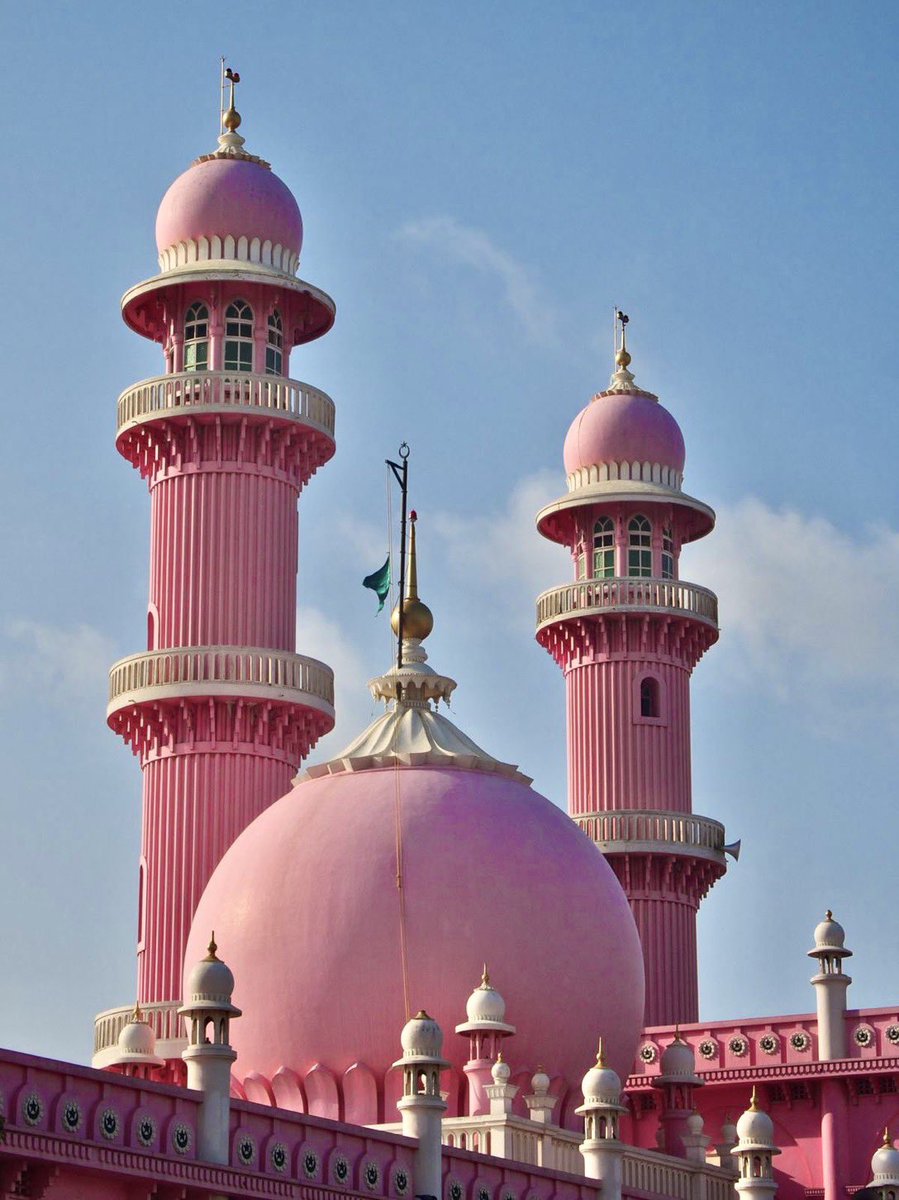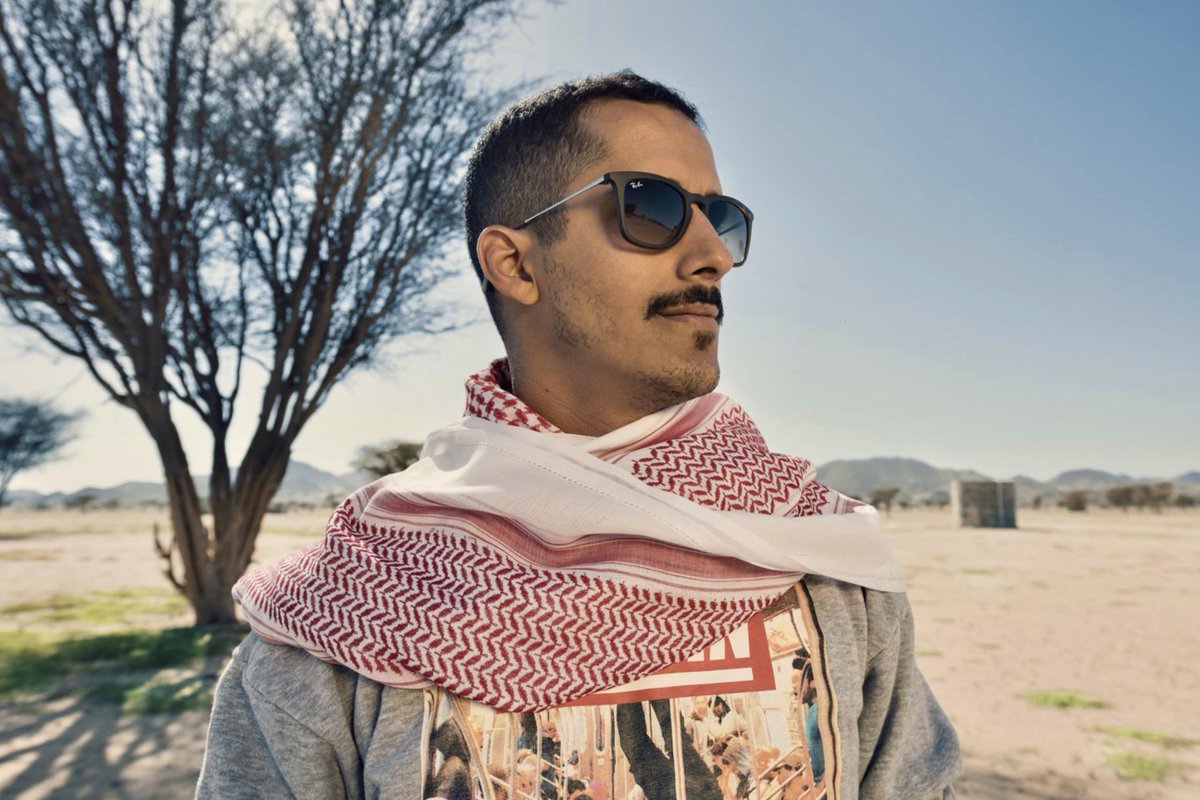
South Asia has the largest population of Muslims in the world, with one-third of all Muslims being from South Asia.
Islam is the dominant religion in half of the South Asian countries.
Here are 20 striking mosques in South Asia… #JummahMubarak
A thread…
Islam is the dominant religion in half of the South Asian countries.
Here are 20 striking mosques in South Asia… #JummahMubarak
A thread…

1/ Markazi Jamia Masjid, Rawalpindi, Pakistan
One of the oldest mosques in Rawalpindi and an architectural beauty. Built almost 100 years ago, the mosque still stands tall among historical sites of the city due to its blue & turquoise mosaics and glass artwork
One of the oldest mosques in Rawalpindi and an architectural beauty. Built almost 100 years ago, the mosque still stands tall among historical sites of the city due to its blue & turquoise mosaics and glass artwork

2/ Dewatagaha Mosque, Colombo, Sri Lanka
Built in 1820, it is the resting place of His Holiness Seyedina As-Sheikh Seyed Usman Siddique Ibn Abdurrahman. Accredited with lovely architecture, it is one of the oldest mosques in Sri Lanka.
Built in 1820, it is the resting place of His Holiness Seyedina As-Sheikh Seyed Usman Siddique Ibn Abdurrahman. Accredited with lovely architecture, it is one of the oldest mosques in Sri Lanka.

3/ Badshahi Masjid, Lahore, Pakistan
Built during Emperor Aurangzeb's rule from 1658 to 1707. It is the fifth largest mosque in the world & was indisputably the largest mosque in the world from 1673 to 1986 when the Faisal Mosque was constructed in Islamabad
Built during Emperor Aurangzeb's rule from 1658 to 1707. It is the fifth largest mosque in the world & was indisputably the largest mosque in the world from 1673 to 1986 when the Faisal Mosque was constructed in Islamabad

4/ Beemapally Mosque, Kerala, India
Beemapally is a region within the city of Thiruvananthapuram in the state of Kerala, India.
This stunning pink mosque was built to honour Syedunnisa Beema Beevi who travelled from Arabia to establish Islam in Kerala
Beemapally is a region within the city of Thiruvananthapuram in the state of Kerala, India.
This stunning pink mosque was built to honour Syedunnisa Beema Beevi who travelled from Arabia to establish Islam in Kerala

5/ The Great Mosque of Herat, Afghanistan
Built by the Ghurids, under the rule of Sultan Ghiyath al-Din Muhammad Ghori, who laid its foundation in 1200 CE. It was extended several times as Herat changed rulers from the Kartids, Timurids, Mughals & then the Uzbeks
Built by the Ghurids, under the rule of Sultan Ghiyath al-Din Muhammad Ghori, who laid its foundation in 1200 CE. It was extended several times as Herat changed rulers from the Kartids, Timurids, Mughals & then the Uzbeks

6/ Chini Masjid, Saidpur, Nilphamari, Bangladesh
Built in 1863, it is one of most significant examples of archaeological heritage in the region. This masjid was built in 1863. Perhaps the best and renowned masjid for its mosaic work or Chini Tikri (glass mosaic) Decoration.
Built in 1863, it is one of most significant examples of archaeological heritage in the region. This masjid was built in 1863. Perhaps the best and renowned masjid for its mosaic work or Chini Tikri (glass mosaic) Decoration.

7/ The Grand Friday Mosque, Male, Maldives
Masjid-al Sultan Mohamed Thakurufaanu-al-A'z'am is the biggest mosque in the Maldives. Opened in 1984 its dominant golden dome & slender Minaret decorate the facade of Male'. It can accommodate over five thousand worshippers at a time.
Masjid-al Sultan Mohamed Thakurufaanu-al-A'z'am is the biggest mosque in the Maldives. Opened in 1984 its dominant golden dome & slender Minaret decorate the facade of Male'. It can accommodate over five thousand worshippers at a time.

8/ Wazir Khan Mosque, Pakistan
The construction began in 1634 C.E. & completed in 1641. Considered to be the most ornately decorated Mughal-era mosque it is renowned for its intricate faience tile work known as kashi-kari, as well as embellished frescoes
The construction began in 1634 C.E. & completed in 1641. Considered to be the most ornately decorated Mughal-era mosque it is renowned for its intricate faience tile work known as kashi-kari, as well as embellished frescoes

9/ Chandanpura Masjid, Chittagong, Bangladesh.
Highly colourful, it has a unique architecture consisting of multiple domes and minarets painted in bright colours.
The mosque's origins are obscure but it was renovated in 1952.
Highly colourful, it has a unique architecture consisting of multiple domes and minarets painted in bright colours.
The mosque's origins are obscure but it was renovated in 1952.

10/ Jama Masjid, Delhi, India
Built by Mughal Emperor Shah Jahan between 1650 & 1656, & inaugurated by its first Imam, Syed Abdul Ghafoor Shah Bukhari. Situated in Old Delhi, it served as the imperial mosque of the Mughal emperors until the end of the empire in 1857
Built by Mughal Emperor Shah Jahan between 1650 & 1656, & inaugurated by its first Imam, Syed Abdul Ghafoor Shah Bukhari. Situated in Old Delhi, it served as the imperial mosque of the Mughal emperors until the end of the empire in 1857

11/ Sachal Sarmast, Sindh, Pakistan
Sachal Sarmast (1739 - 1829) was a Sufi poet & is also popularly known as Shair-e-Haft Zaban (poet of seven languages) and Sartaj-us-Shuara. This tomb with mosque was built in his honour
Sachal Sarmast (1739 - 1829) was a Sufi poet & is also popularly known as Shair-e-Haft Zaban (poet of seven languages) and Sartaj-us-Shuara. This tomb with mosque was built in his honour

12/ Makkah Masjid or Mecca Masjid, Hyderabad, India.
A congregational mosque, it is one of the largest mosques in India with a capacity of 10,000 people. The mosque was built during the 17th century, and is a state-protected monument.
A congregational mosque, it is one of the largest mosques in India with a capacity of 10,000 people. The mosque was built during the 17th century, and is a state-protected monument.

13/ Bhong Mosque, Rahim Yar Khan District, Pakistan
Made over a period of nearly 50 years (1932–1982) and won the Aga Khan Award for Architecture in 1986. Master Abdul Hameed (kamboh) led the construction of the mosque, making sure it was a landmark. It has ornate interiors.
Made over a period of nearly 50 years (1932–1982) and won the Aga Khan Award for Architecture in 1986. Master Abdul Hameed (kamboh) led the construction of the mosque, making sure it was a landmark. It has ornate interiors.

14/ Blue Mosque, Mazari Sharif, Afghanistan
Many Afghanis believe Ali ibn Abi Talib is buried here. The building gives the city, Mazari Sharif (meaning "Tomb of the Exalted") its name. The shrine was erected here in 1136 and is famous for its beautiful blue tiles
Many Afghanis believe Ali ibn Abi Talib is buried here. The building gives the city, Mazari Sharif (meaning "Tomb of the Exalted") its name. The shrine was erected here in 1136 and is famous for its beautiful blue tiles

15/ Jami Ul-Alfar Mosque in Colombo, Sri Lanka.
This distinctive colourful red and white striped two-storey building, with a clock tower, was built in 1909.
Its architecture was inspired by the pomegranate, which is manifested in the building colour and shape of the domes.
This distinctive colourful red and white striped two-storey building, with a clock tower, was built in 1909.
Its architecture was inspired by the pomegranate, which is manifested in the building colour and shape of the domes.

16/ Nagina Masjid, Agra, India
A white marble architectural mosque at Agra Fort used by the women of the Royal harem. Agra Fort is a classic Mughal Indian architectural fort and palace located at Agra, Uttar Pradesh. A UNESCO World Heritage site.
A white marble architectural mosque at Agra Fort used by the women of the Royal harem. Agra Fort is a classic Mughal Indian architectural fort and palace located at Agra, Uttar Pradesh. A UNESCO World Heritage site.

17/ Green mosque in Vizhinjam, India
This green mosque is an iconic piece of architecture in this fishing village.
This green mosque is an iconic piece of architecture in this fishing village.

18/ Shah Rukn-e-Alam, Multan, Pakistan
Built between 1320 & 1324 CE by Ghiyath al-Din Tughluq in the pre-Mughal architectural style. It is the mausoleum of Sufi saint Sheikh Rukn-ud-Din Abul Fateh & is the earliest example of Tughluq architecture, with blue tile details
Built between 1320 & 1324 CE by Ghiyath al-Din Tughluq in the pre-Mughal architectural style. It is the mausoleum of Sufi saint Sheikh Rukn-ud-Din Abul Fateh & is the earliest example of Tughluq architecture, with blue tile details

19/ Old Friday Mosque, Malé, Maldives
One of the oldest and most ornate mosques in Malé, the Hukuru Miskiy dates back to 1656 and has been added to the UNESCO World Heritage cultural list as a unique example of sea-culture architecture.
One of the oldest and most ornate mosques in Malé, the Hukuru Miskiy dates back to 1656 and has been added to the UNESCO World Heritage cultural list as a unique example of sea-culture architecture.

20/ 201 Dome Mosque, South Pathalia village, Bangladesh
Still under construction, which began in 2013. The central dome is surrounded by 200 smaller domes. The minaret is expected to be the highest minaret in Bangladesh. The western wall will be inscribed with the entire Qur'an.
Still under construction, which began in 2013. The central dome is surrounded by 200 smaller domes. The minaret is expected to be the highest minaret in Bangladesh. The western wall will be inscribed with the entire Qur'an.

• • •
Missing some Tweet in this thread? You can try to
force a refresh



















